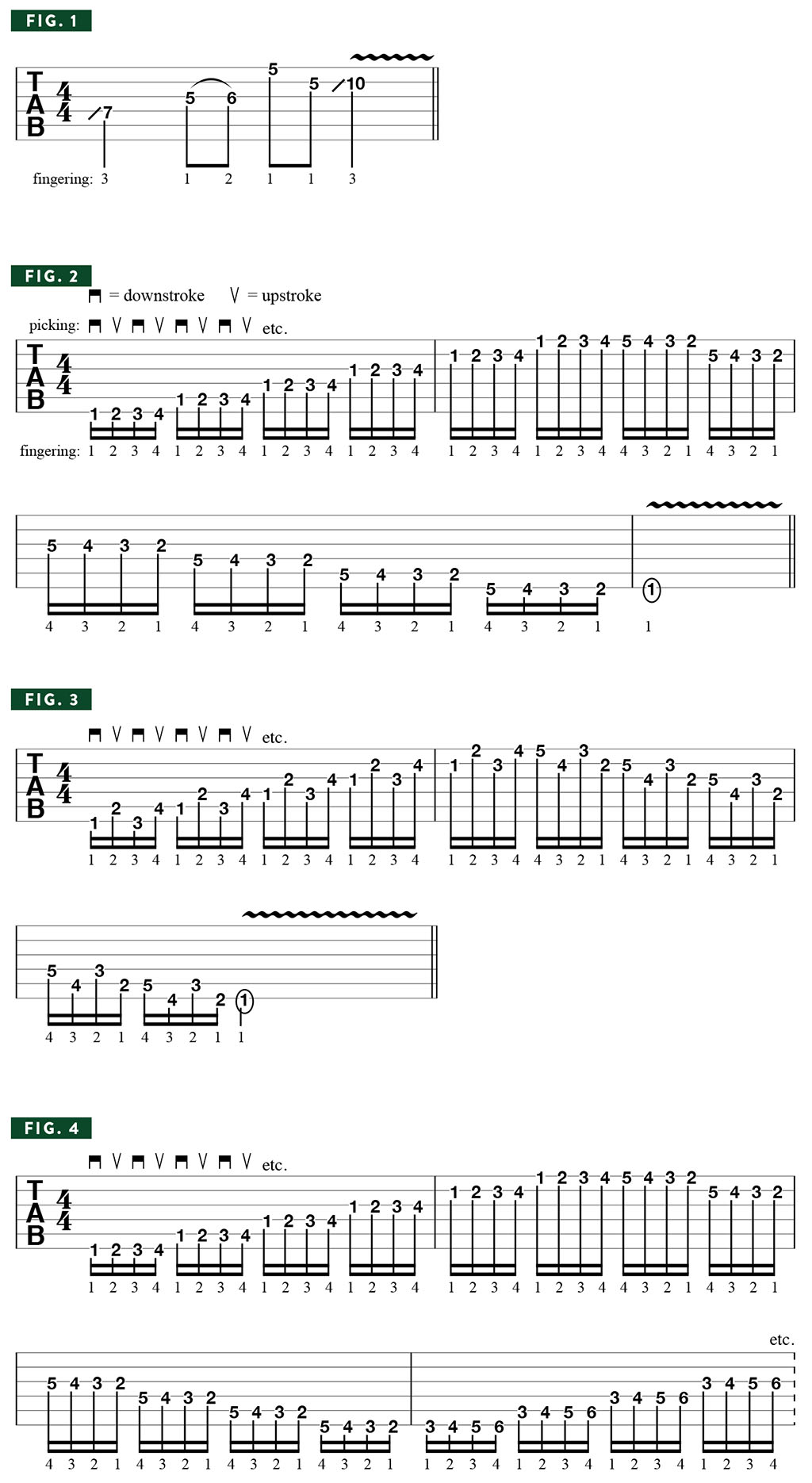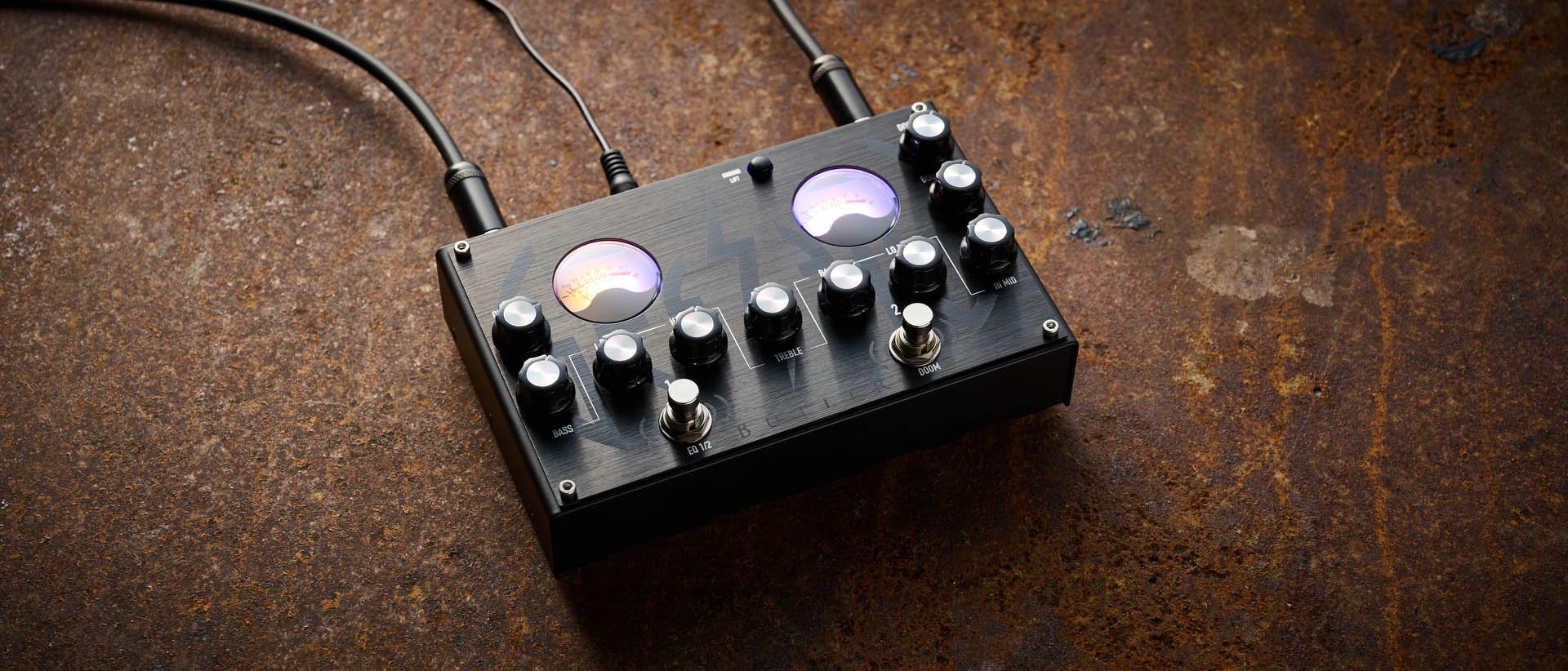Zakk Wylde reveals 15 in-depth playing tips that will take your playing from basic to brewtal
The living legend joins Guitar World for an exclusive interview and lesson to celebrate the 20th anniversary of Black Label Society
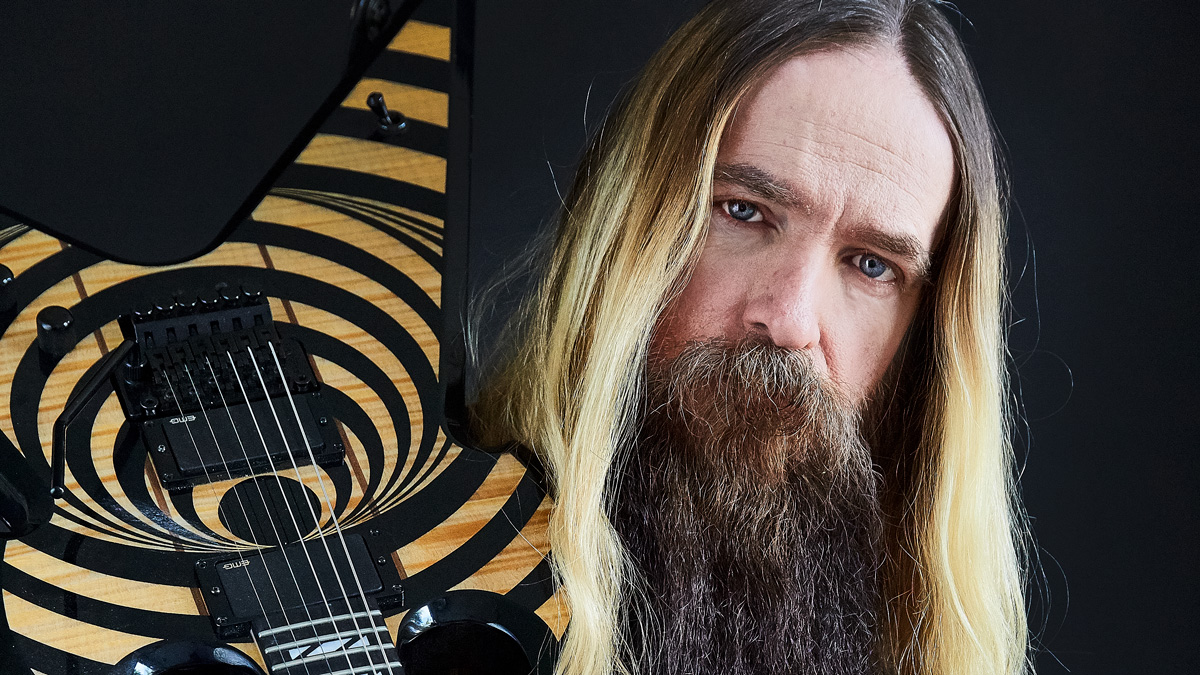
It’s been a staggering 31 years since a 20-year-old Zakk Wylde exploded onto the rock scene as Ozzy Osbourne’s newest axeman in 1988. Since then, Zakk has become one of the hardest-working guitarists out there, in terms of recording and touring.
He’s justifiably highly respected by the public, press and his peers and remains a popular cover-story artist for rock and guitar publications all over the globe. Hell, Zakk’s image has adorned the cover of Guitar World alone some 13 times! Not too shabby!
2019 marks the 20th anniversary of Zakk’s beloved creation, Black Label Society. To celebrate this landmark, BLS released their 10th studio album, Grimmest Hits, last year.
After all the well-earned coverage Zakk has received in the pages of GW over the past three decades, his fascinating career path is well known. And thanks to a number of Private Lesson features, his extremely popular Brewtality monthly columns and a much-lauded Boot Camp cover story in our July 2004 issue, so too are his teaching skills.
We recently scored some quality time with Zakk on his tour bus in Dallas. He was there with one of his successful projects, Zakk Sabbath, performing at the 2019 Ride for Dimebash charity show, a reverent celebration of his dearly missed friend and fellow guitar great, the late Dimebag Darrell Abbott (or, as Zakk refers to him, Saint Dime) and Darrell’s recently departed brother, Vinnie Paul, who played drums with Darrell in the legendary metal outfit Pantera.
Intro over, take it away, Mr. Wylde… “Did I expect Black Label Society to still be touring, recording and ‘successful’ today, when I first formed the band in 1999?” Zakk muses, repeating my opening question verbatim. The wry grin on his face braced me for one of his trademark comebacks.
BLS was planned to run up a massive bar tab, and then to be constantly working to pay the thing off
“Yes, of course. The whole project was planned to run up a massive bar tab, and then to be constantly working to pay the thing off. That was it - it was all by design. And right now, it’s going incredibly well. We work like dogs and I’m still broke paying off that tab. So yes, it is very ‘successful’ in that regard!”
All the latest guitar news, interviews, lessons, reviews, deals and more, direct to your inbox!
A lot of things have changed during Zakk’s lengthy tenure in the “cruel and shallow money trench,” as Hunter S. Thompson so eloquently referred to show business. A biggie for all bands today is the ever-growing need for profitable touring and merchandising, due to the precipitous decline in revenue from album sales. Thankfully, Zakk and BLS are extremely savvy and successful in both the aforementioned areas.
“No More Tears [released in 1991] doesn’t seem that long ago, but everything has changed since then,” Zakk nods in agreement. “There will never be another Led Zeppelin IV, Back in Black or Appetite for Destruction. Albums are like rotary phones now - they’re obsolete because we don’t use them anymore.
“I mean, they’re not even teaching cursive script handwriting to kids in schools anymore. And, I’m like, ‘So how are you supposed to sign your name?’ And my son, Sabbath Page [Zakk’s youngest of four, great name!], goes, ‘with a fingerprint, Dad!’ And I get it - no one uses script, ’cos they’re on the phone all the time.”
Has the daunting drop in album sales diminished Zakk’s seemingly indomitable drive? Not one bit.
“I don’t think any real musician ever goes, ‘I’m doing this so I can get chicks, loads of money, a nice car and a big-ass house,’” is Wylde’s immediate response.
“That’s not the reason you learn to play a Zeppelin, Sabbath or Mahavishnu Orchestra song. I think that with any true musician, it’s about the love and joy of playing. That’s what drives me. Period. I’m blessed, man. I wouldn’t change my life for anything.
If I wasn’t blessed with having Ozzy in my life, or we didn’t have our Black Label Society family, everything would still revolve around music
“Your drive should be your passion,” the guitarist continues with genuine zeal. “Find what you love and then drive it into the ground. That’s what I always say about the immortal beloved, [his wife] Barbaranne. Know what I’m saying? That’s why we’re here! Find what you love and do that, be it playing guitar, working on cars or whatever. I mean, why would you wanna do anything else?
“It’s like me and J.D. [DeServio, BLS/Zakk Sabbath bassist and longtime friend] always talk about,” Zakk enthuses, now on an almost evangelical roll.
“If I wasn’t blessed with having Ozzy in my life, or we didn’t have our Black Label Society family, everything would still revolve around music. We’d own a music store, we’d teach, we’d have our cover bands and our wedding bands. We wouldn’t have crummy day jobs that we can’t stand; we’d figure out a way to pay the bills playing music, man.
“I’ve got plenty of buddies who are doing exactly that - they’re not playing Madison Square Garden, but they’re still managing to make a living doing what they love… and they’re happy. I’ve also known people who make a lot of money doing something they can’t stand, and they’re beyond miserable.”

I first interviewed Zakk in 1989 for a British guitar magazine cover story, and we briefly touched on some of the topics we discussed, including the fact that he reappraised his playing approach pretty brutally in his teens.
“I got totally caught up in that, ‘I wanna blow everyone else away,’ ego trip,” Wylde revealed some 30 years ago.
I was into mastering the hardest songs, scales and techniques possible. Looking back, that was a big mistake
“I was into mastering the hardest songs, scales and techniques possible. Looking back, that was a big mistake because although I was fast, I wasn’t thinking about important stuff like phrasing, vibrato or string bending. It was a total speed thing, and nothing else mattered to me. It was pretty pathetic!”
What sparked the change? Well, Zakk’s band Zyris opened up for TT Quick, and the playing of lead guitarist Dave DiPietro had a profound impact on the 17-year-old Wylde.
“His lead work blew me away,” Zakk recalls. “He was playing bluesy stuff with a lot of pentatonics - all the things I considered cheesy at the time. And it sounded great - like music. What a concept! Dave also played the fast, three-notes-per string diatonic stuff like I was, but I couldn’t do what he was doing.
“I didn’t just hear Dave, I felt him, and that’s the true mark of any amazing musician. He definitely opened my eyes to a whole other world outside of exotic scales and impressive techniques.
“I remember him showing me this Alvin Lee-style lick in A,” Zakk shares, playing FIGURE 1.
“It’s really simple, but it sounds like music, as opposed to me just running scales. Watching and listening to Dave was great for my development as a player. He taught me how to slow down, use vibrato, do bends properly and actually think about what I was playing in the context of a song.”
As mentioned earlier, way back in the July 2004 issue of GW, I had the honor of working with Mr. Wylde on his very popular Guitar Boot Camp lesson. In that lesson, he hit on a Nigel Tufnel-approved list of 11 key points. So, we figured it’d be interesting to revisit those points 15 years later - and maybe even add a couple. The playing examples are all taken from our many lesson sessions together. Here we go!
1. Give it all you've got
“Whether you’re doing the dishes at the house, making your bed, playing guitar, playing a sport or what have you — give it all you’ve got! Leave nothing to chance. Like some old-timers always say, ‘give it all you’ve got on stage because it might be your last show!’” Wylde adds, “Also, get inspired. Every time I see or hear a great player, I still think, ‘I’ve got work to do … time to make the donuts!’”
2. Be disciplined
“Even during my drinking years, I still enjoyed finding the balance between the dedicated discipline of Al Di Meola and John McLaughlin and the complete chaos of Keith Richards and Jimmy Page. No matter how crazy those berserker, Animal House years were, you always had to answer the bell when it was show time. It wasn’t until the very end, when the wheels were falling off, that I went, ‘Man, I think this debacle is coming to an end!’
If you want to be as good as people like, say, Dime or Yngwie, you need to be totally disciplined about practicing and the relentless pursuit of getting better
“If you want to be as good as people like, say, Dime or Yngwie,” Zakk continues with a much more serious and assertive tone, “you need to be totally disciplined about practicing and the relentless pursuit of getting better. You either strive for greatness or you go home. It’s all or nothing - there are no participation medals in this game, son!
“When I’m practicing, I like to start off with a few chromatic exercises, using all four of my fret-hand fingers and strict alternate picking.”
To demonstrate this, Zakk cranks out FIGURES 2 and 3 with impressive speed and accuracy.
“And, I’ll often take both of them all the way up the neck, from the 1st fret to the 15th, and then back down again. That’s a great workout for both hands.” To illustrate his point, Zakk starts playing the ascending pattern in FIGURE 4, which is the “full meal deal” version of FIGURE 2.
“Another thing I’ll often do is run through the five minor pentatonic [five-note] ‘box’ patterns all over the neck in a few keys.” FIGURE 5 shows the five box shapes for the A minor pentatonic scale (A, C, D, E, G).
“As you’ll see - each pattern is only two notes per string. I’ll also do the same for the diatonic [seven-note] natural minor scale too. This time we’ll be playing three notes on each string, and there are seven patterns for this one.”
FIGURE 6 shows the seven three-notes-per-string box shapes for the A diatonic natural minor scale (A, B, C, D, E, F, G) also known as the A Aeolian mode.
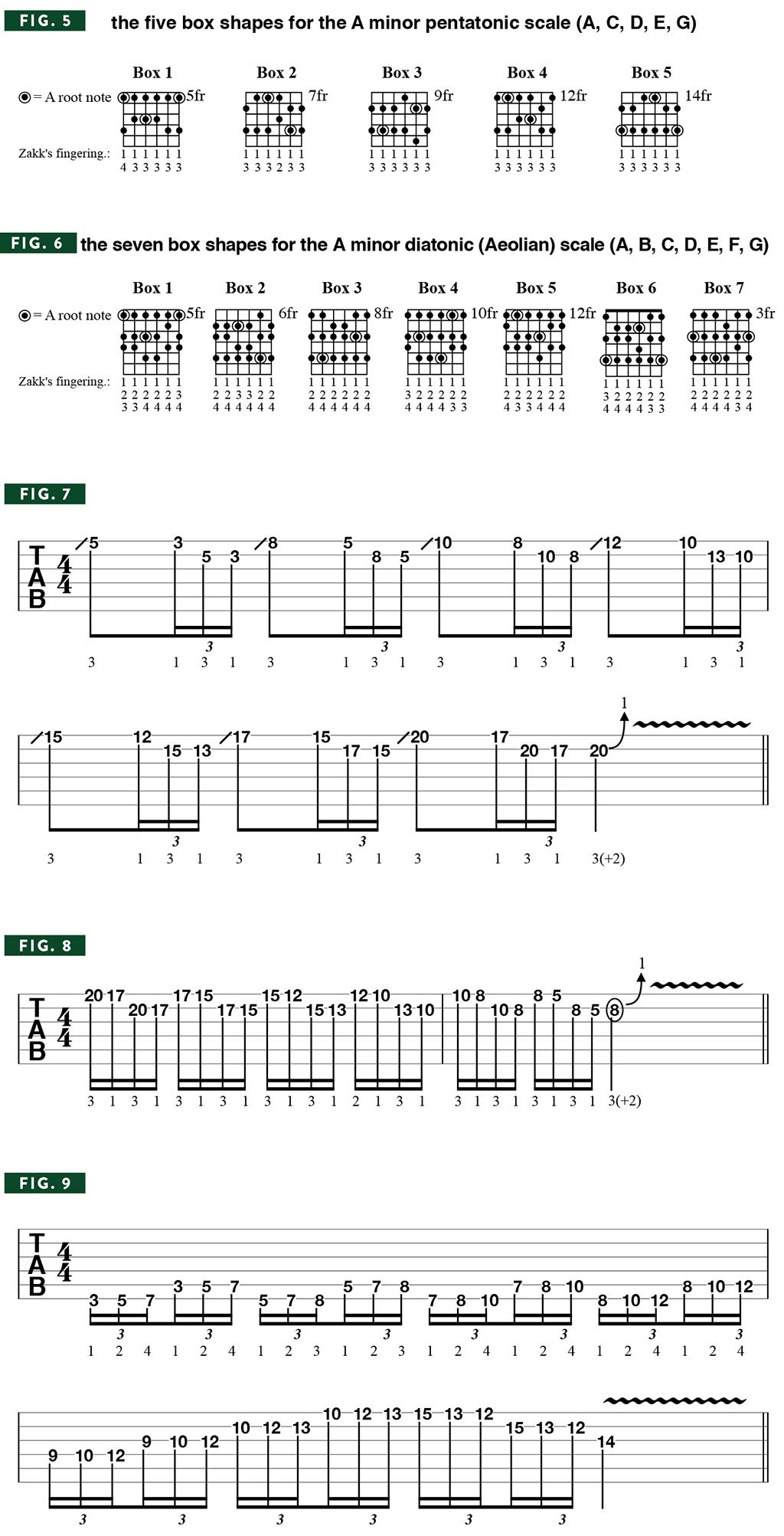
“I realize this kind of stuff can be boring as hell, but stick with it and it’ll pay off. When you really know all these scale patterns back-to-front and inside-out, all over the neck, you’ll be able to solo anywhere on the fretboard with confidence. In my opinion, these patterns form the basic framework you need to know, so that you can rip out some killer leads.”
3. Connecting the dots
Zakk is a great believer in “connecting the dots.” This requires knowing the patterns presented above so well that you can link them together without thinking about it. “This is important because it opens up the whole neck, so that you can move freely and smoothly all over it,” Zakk says. “Up and down the fretboard, as well as just across it.”
FIGURE 7 is an A minor pentatonic “connect-the-dots” run that ascends the high E and B strings, while FIGURE 8 is the descending version of the same idea using 16th notes. FIGURE 9 is a three-notes-per-string A diatonic minor run that climbs up the low E and A strings then moves across the neck before ending with a short descent to the A root note at the 14th fret on the G string.
Zakk recommends you try playing these kinds of runs over your favorite songs. “Doing this will make them sound more interesting and, more importantly, it’ll teach you how to use them within the context of a real song,” he affirms.
4. Pentatonic and blues hardcore
“When I first got the gig with Ozzy, I immediately thought: ‘Kick ass! Now how the hell am I going to sound like me?!’” Zakk recollects with a hearty laugh.
“I was like, ‘What do I need to do to become Zakk Wylde?!’ The first thing I did was make a list of all the stuff I felt I shouldn’t do. I decided I wouldn’t do any tapping or whammy bar antics because that’s Eddie’s thing. And I obviously wasn’t gonna be doing any sweep picking either, because Yngwie owns that domain.
“I also felt I couldn’t do any classical guitar, as that was Saint Randy’s thing - and so were harmonic minor scales and diminished arpeggios. I was already a guy with long blonde hair and a blonde Les Paul, so that was the last thing I wanted to do! That’s why I put the Bullseye on my guitar - which, using 20/20 hindsight, wasn’t a particularly smart move, as it made me an even easier target to throw stuff at on stage! [Laughs]
“Anyways, once I’d made this list, I looked it over and went, ‘Damn, what’s left?’ And the only things were the pentatonic and blues scales [minor pentatonic minor with the b5 added: see FIGURE 10]. So, I had to use my noggin and see what I could come up with, using a limited amount of crayons.”
As revealed in his celebrated lead playing with Ozzy and BLS, Zakk’s furiously fast, alternate-picked, trademark pentatonic fury, peppered with muscular vibrato proved not only that he was extremely adept at doing “more with less,” it also deservedly made him a global guitar hero. Here are a few examples of Wylde’s brilliant use of these two seemingly simple scales.
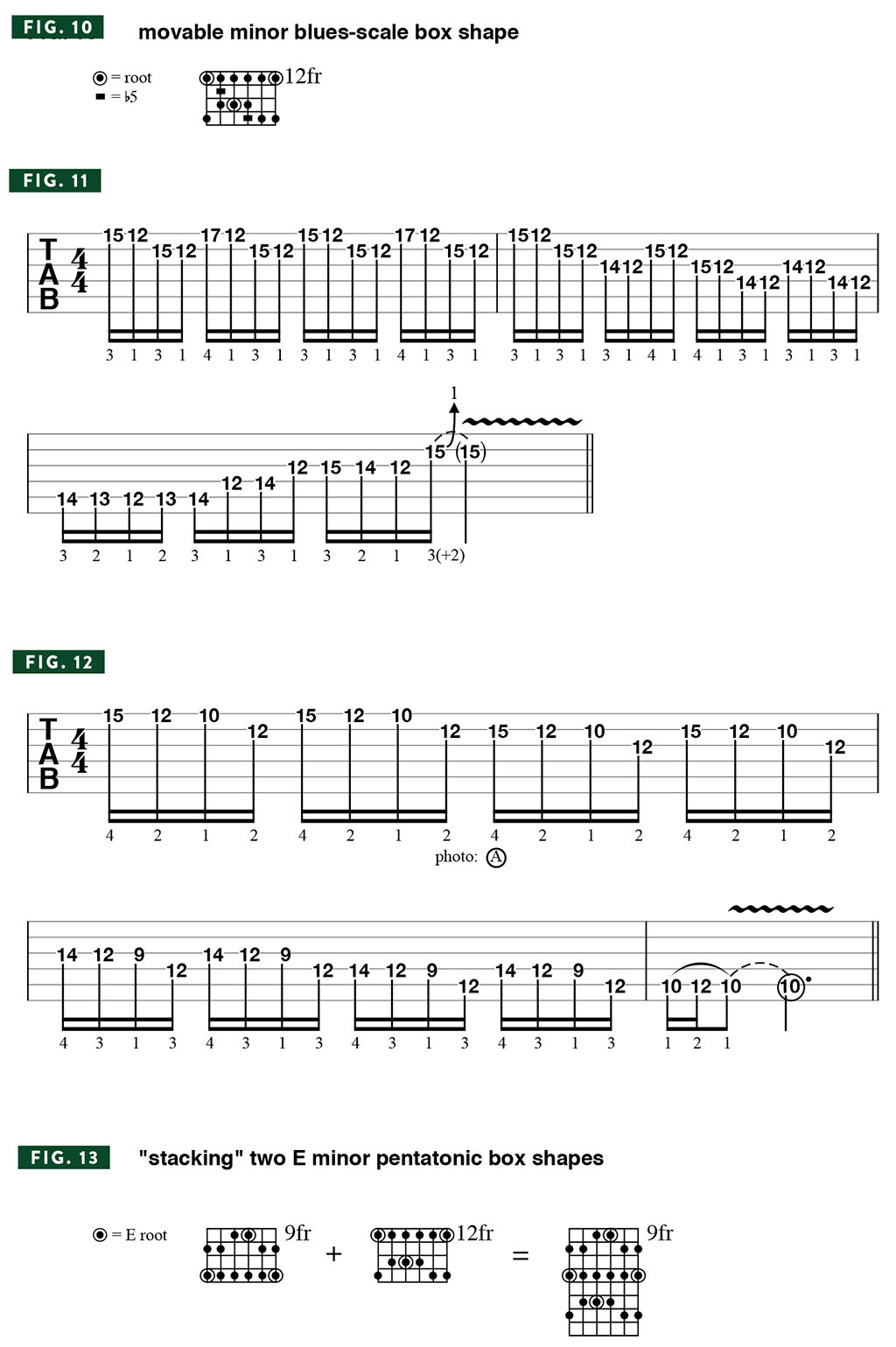
FIGURE 11 is an E minor blues-scale run in 12th position that requires some rather wide fret-hand finger stretches in the opening bar.
FIGURE 12 is another wide-stretch E minor run that combines or, perhaps I should say, stacks, the two overlapping minor pentatonic box patterns together, as illustrated in FIGURE 13.
FIGURE 14 is yet another sinewy, E minor-blues excursion with a very symmetrical vibe.
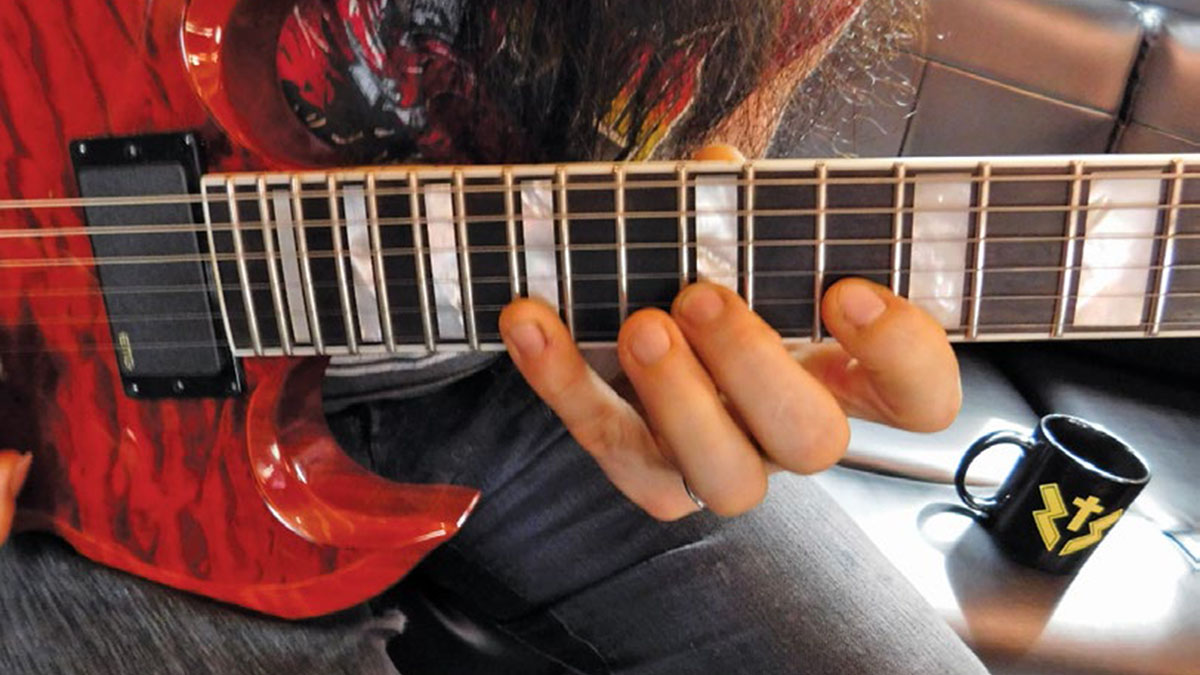
5. Start out slow and easy
“Whether it’s Gary Moore, Paul Gilbert, Michael Schenker, Rusty Cooley or any of the players that we know who have insane technique, they’ll all tell you the same thing — always start slow. The same is true of warming up, especially if your hands are cold.
“My warm-up routine before a show? Some female growth hormones, a pedicure, a couple of lunges and I’m ready to go. Nothing’s really changed since that first Ozzy show I did at Wormwood Scrubs Prison, England, in 1987 [Note: Zakk’s not joking about the prison concert. That really took place]!”
6. Clock it
“A metronome is always a perfect point of reference, because you can see if your bench press is getting bigger. Even if you’re only putting two pounds more weight on the bar, it’s like, ‘Oh, man! That’s an achievement.’
“Pretty much any serious player will tell you that a metronome is essential for honing a technique, because it objectively gauges your speed and accuracy. Even if it’s only just a smidgen faster but you’re playing it clean, that’s a win in my book.”
7. Play it again
“Repetition is the mother of skill … always. Is it boring? Yeah, it can be boring, but if you want results, you gotta deal with it. And once you start seeing those results and start playing better, it’s the coolest thing in the world.”
8. Practice at every opportunity
“Without a doubt. Even if you can only get 10 minutes in today, you’ll still be 10 minutes better than you were yesterday. So cram in as much as you can, and do it consistently.”
9. Try out new things
“If you’re in a rut or just bored, trying something new is always great because it helps break the monotony. It’s also good if it’s one of those, ‘I’ve always wanted to try this’ things. And eventually, if you stick with it, it’ll probably find its way into your playing.
“It’s just another crayon in your coloring box, or a new seasoning in the kitchen that you might use one day. It can’t hurt — it’s now in your ‘Rolodex of Knowledge,’ so it’s all good.”
10. Make it musical
“When you listen to Al Di Meola, yes, he’s using scales! We know that and we also know he has an incredible knowledge of the instrument. But, when he’s playing, it’s all about what he’s feeling - it’s musical ... it’s emotional.
“I mean, when you hear David Gilmour playing his Comfortably Numb end solo, you know it’s pentatonic for the most part, but you’re not thinking scales, you’re just going, ‘wow’ because what he’s doing sounds so monumental. And it’s the same when you hear Randy playing Mr. Crowley - you know it’s minor pentatonic and diatonic scales, but it’s the way he played them. You feel it.
“For me, adding things like slurs [hammer- ons, pull-offs and slides], bends, vibrato and passing tones into my playing helped make it more musical. A passing tone is merely a note that would sound wrong if you stopped on it, but it sounds killer if you just briefly touch on it on your way to another note. Frank Marino is a master of using passing tones - whenever I listen to his playing, I still get inspired. He’s one of my Top 3, without a doubt.”
FIGURE 15 is a great example of Zakk making effective use of passing tones in an E minor-blues passage.
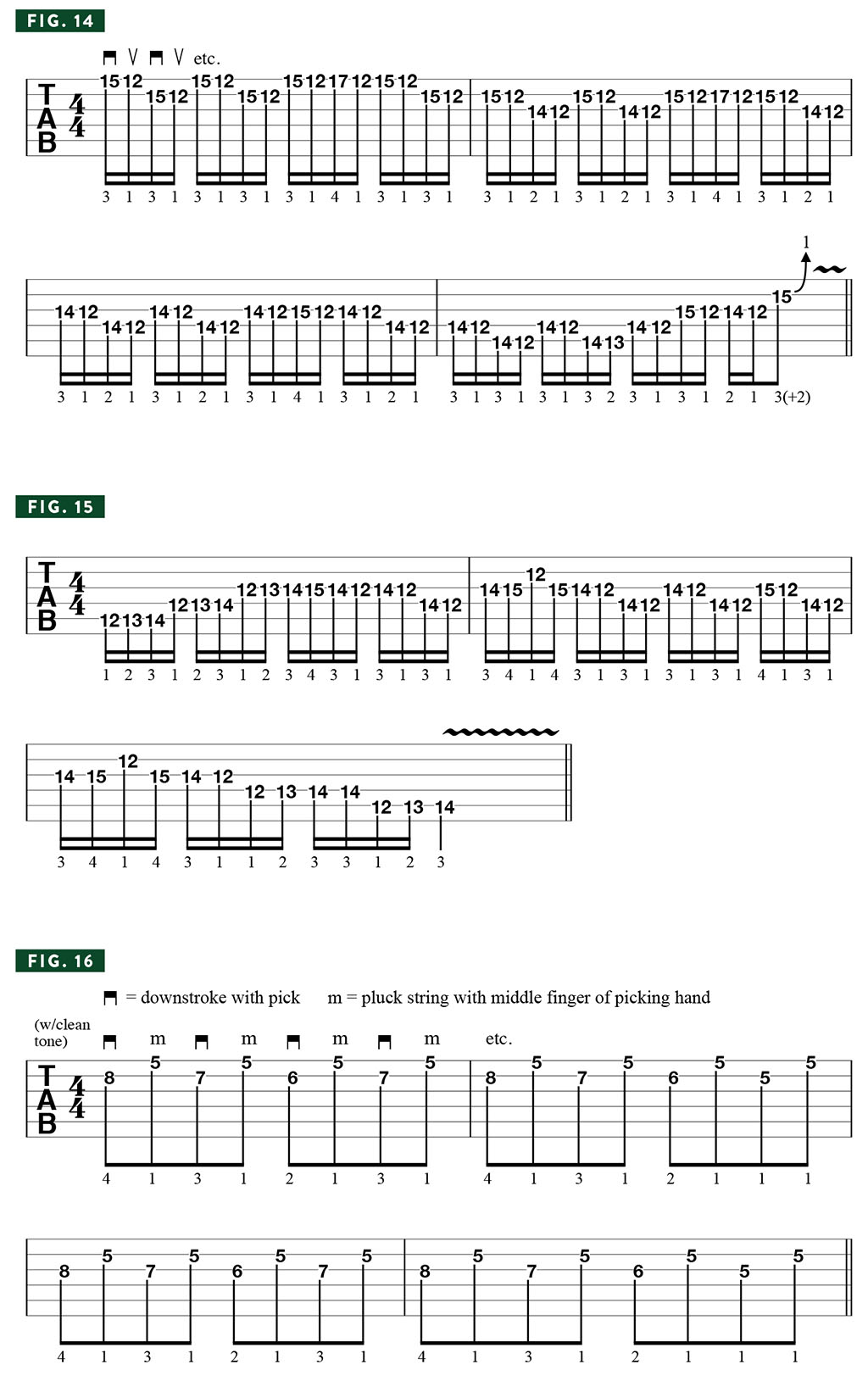
11. Follow greatness
“Always try to surround yourself with musical greatness that you love because it’ll inspire you and take you to new places. That’s how I got into chicken pickin’ [using the bare fingers to aggressively pluck the strings, either in conjunction with or in opposition to the pick/plectrum].
“I saw Albert Lee play and was blown away; he literally gave me goosebumps. I just love the sound of country guitar. Those guys have incredible technique and always sound so musical. I bought Albert’s VHS video teaching tape back in the day, which was great because he broke ‘building that engine’ down into ‘that piece goes here, and that part goes there.’
“Being able to use my middle and ring fingers to pluck the strings, as well as my pick makes double- stops [two notes played at the same time] and string-skipping licks so much easier to play than trying to use only the pick for everything.”
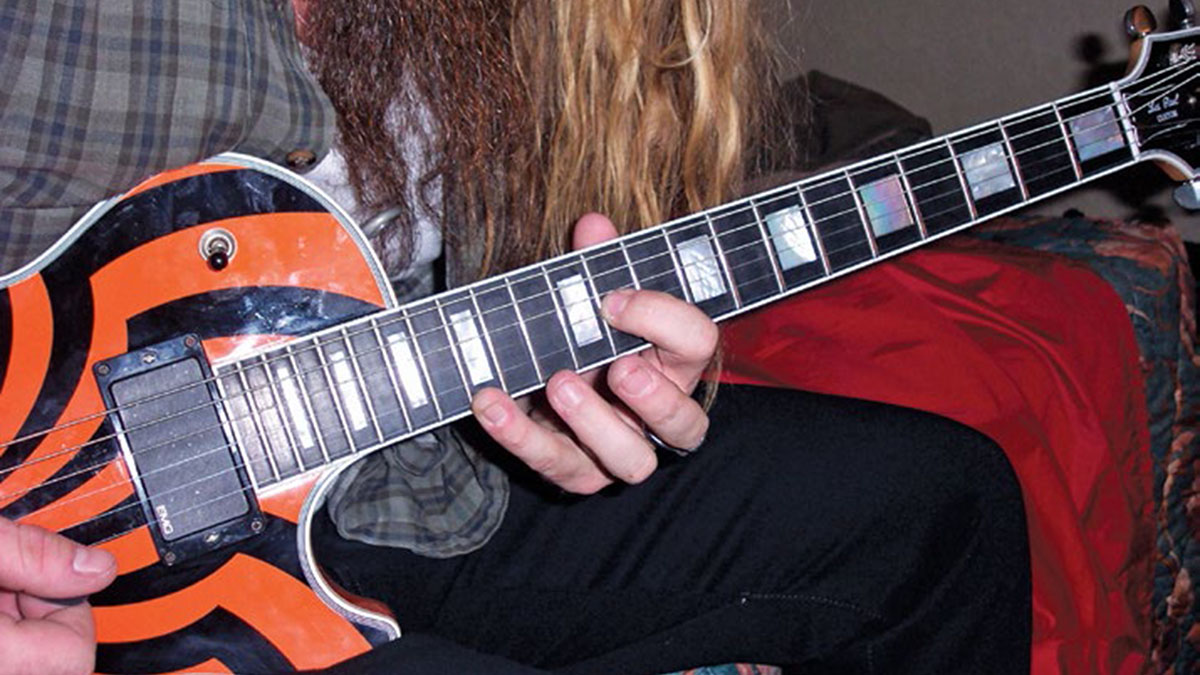
FIGURES 16 and 17 are simple introductions to the chicken pickin’ technique. FIGURE 18 is a string-skipping ditty that Zakk calls the “clown show lick”, and FIGURE 19 is a brief, bluesy burst that employs string-skipping and double-stops.
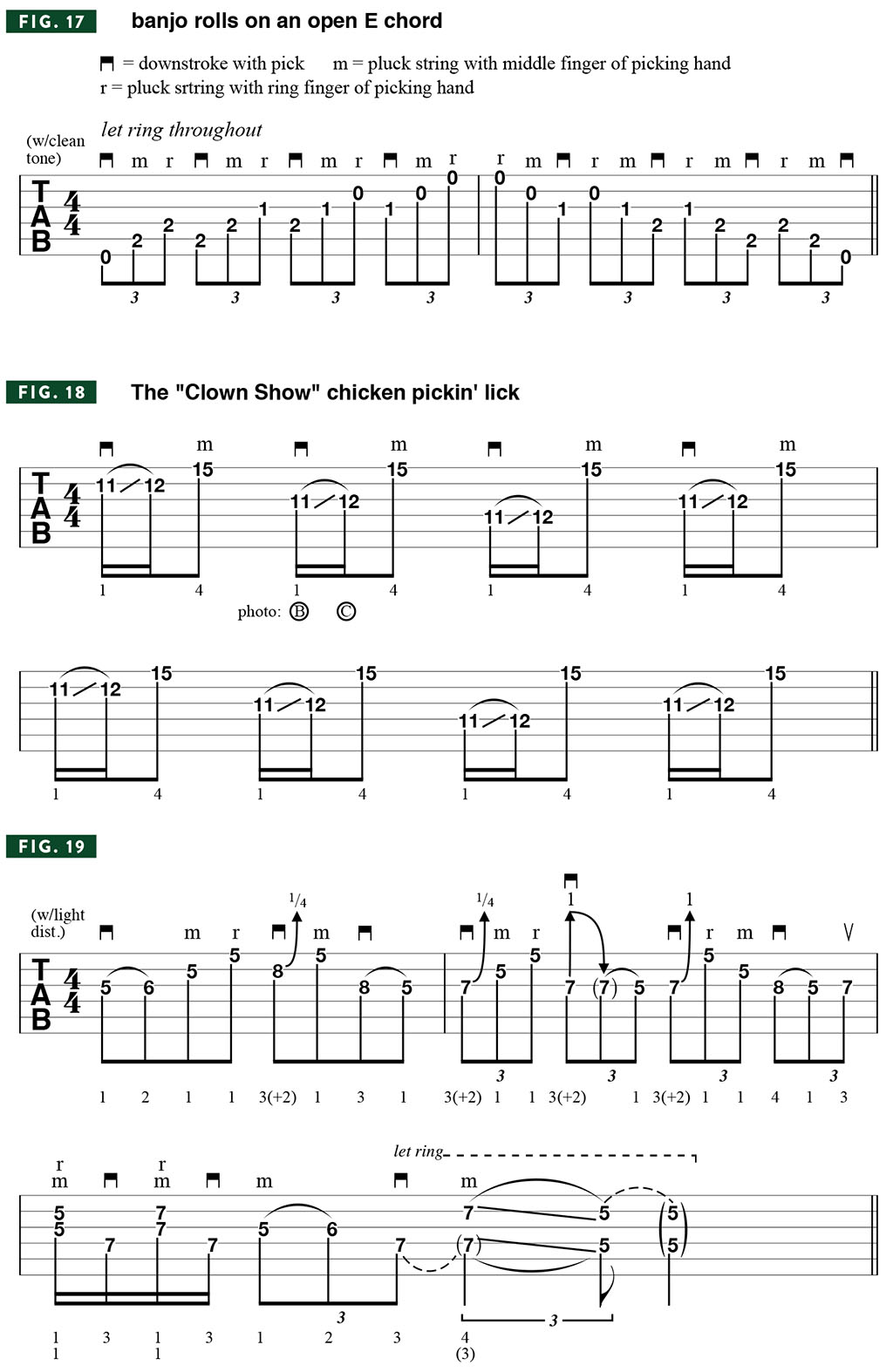
12. Climb Mount Riffmore
“There are different ways to write songs, but I always gravitate toward riffs because you immediately know what the song is without having to hear the vocal melody.
“The guys on Mount Riffmore would obviously be Lord Iommi, Pope Page and Sorcerer Blackmore. Iron Man, Smoke on the Water and Whole Lotta Love - that’s the Holy Trinity of classic hard rock/metal riffs, man. If you want to know how to build a car, that’s how it’s constructed. You can tweak it all you want, but that’s the basic construction.”
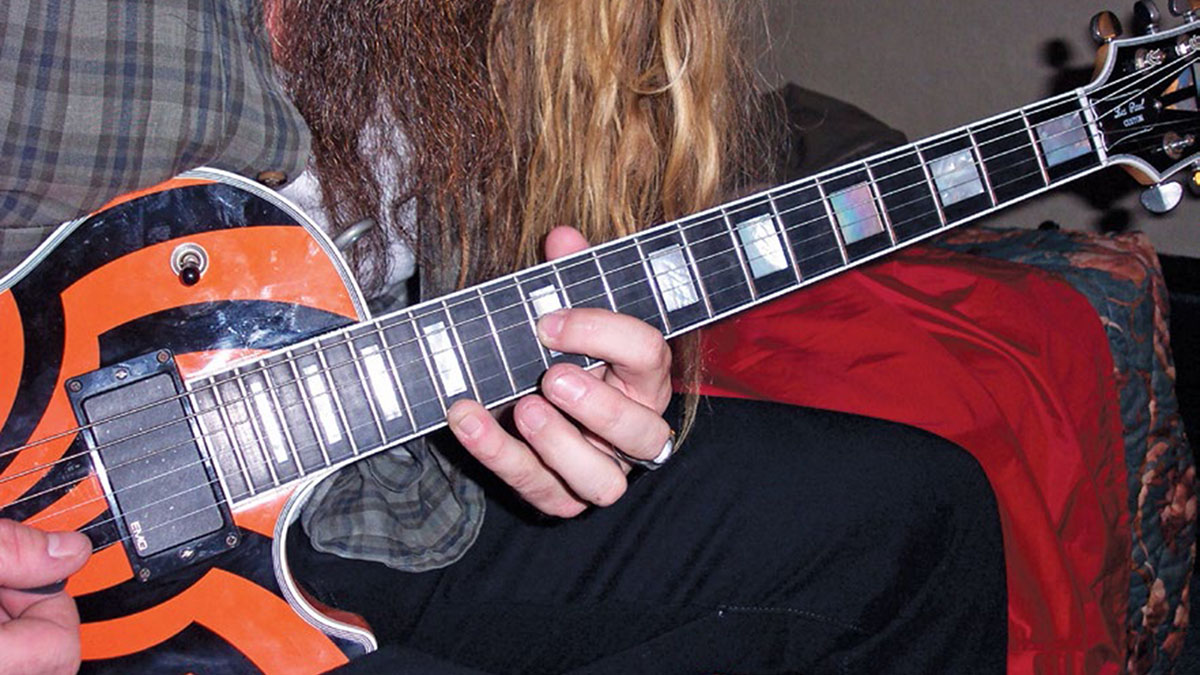
13. Play efficiently
“When I was 15 and trying to learn other people’s stuff, until I started really breaking it down, I was invariably playing it the hardest way possible! It was like I was trying to climb a steep mountain when there’s an elevator right there! That skill comes with time, I guess. It’s all about being as efficient as you can. Everything I do is geared for that.”
To this end, even though Zakk is a pretty staunch advocate of strict alternate picking, he also employs economy picking whenever it makes sense and will often tweak a lick or run accordingly. [Note: Economy picking is a technique that involves using either two consecutive downstrokes or upstrokes in a row when crossing to an adjacent string.]
FIGURE 20 is a signature, Wylde-style E minor run played with strict alternate picking, and FIGURE 21 is the same riff but with slight fingering and picking adjustments made for economy and efficiency. Compare the two and all will be revealed.
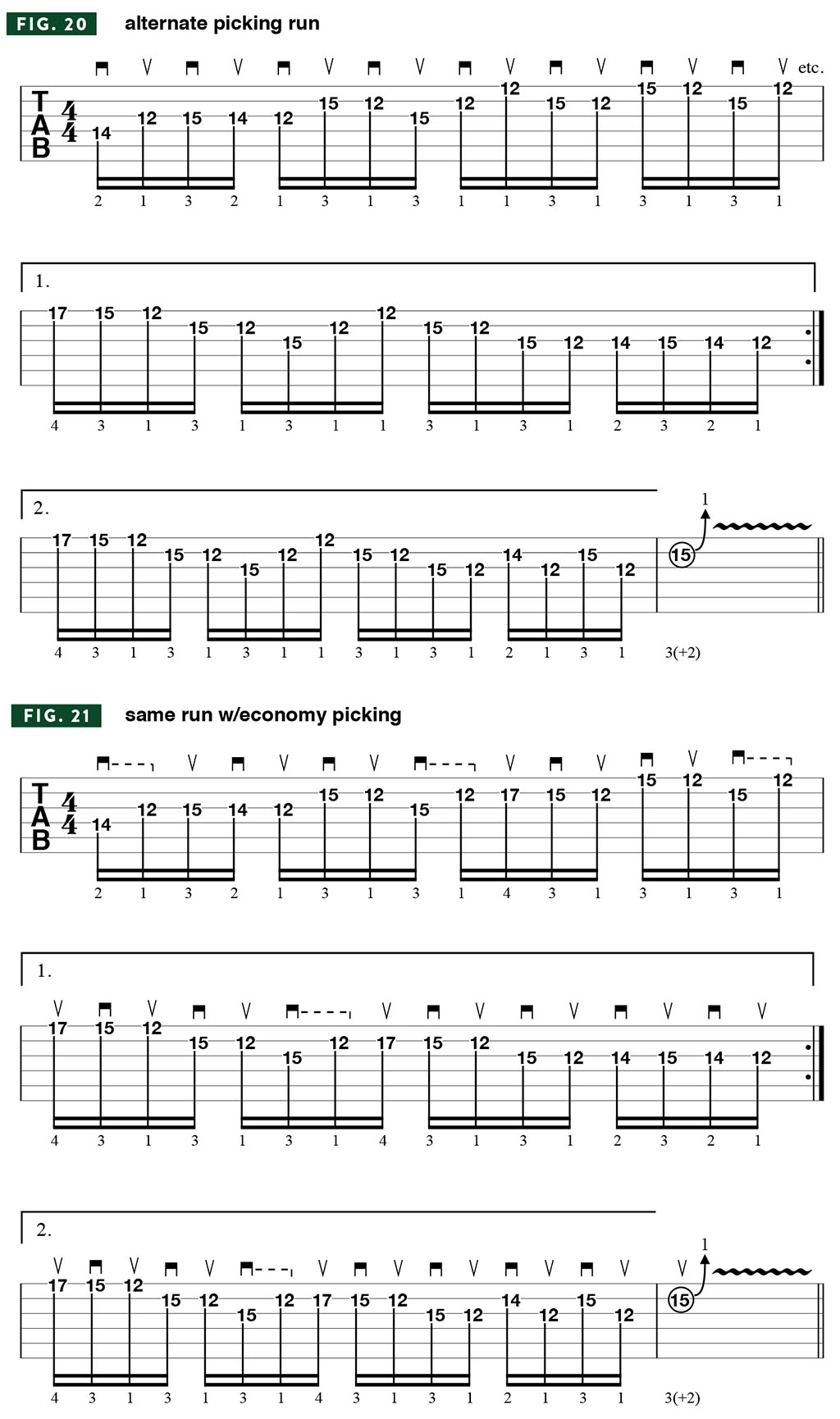
14. There is no 'right' way, just your way
“Everybody’s different, man. Just compare the picking techniques of amazing players like Eddie Van Halen, Steve Morse and Marty Friedman. It’s like a batting stance - whatever works best for you, your style and body type.
“It also depends on what you want to hear, too. There’s no right or wrong way to play; whatever feels good to you is the right way for you.”
15. Be true to your music and yourself
“Never follow a trend just because it’s popular, unless it truly moves you. When a kid asks me for advice about what they should play, I always ask ’em what they like. And if they say, ‘I love Dimebag and Slayer, I tell ’em, ‘then you should do stuff that’s in that ZIP code.’ Stick to your guns and play what you love.”

